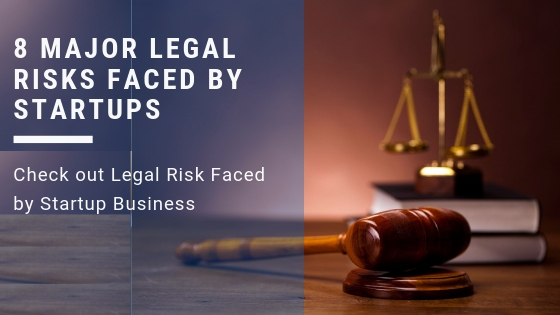One of the biggest mistakes made by new business owners is to not engage startup legal services to handle possible issues for their new venture. Beginning an enterprise needs planning not only for marketing and growing the business but also to eliminate the legal risks faced by startups. Such hazards can easily derail a new company even before it starts running its operations. Every aspect of running a business is governed by one or the other law and entrepreneurs must know about all the regulations which affect their organization. The following list of major legal hazards faced by new companies will be helpful for individuals looking to begin a commercial venture.
1. Incorrect Legal Structure Of The New Business
One of the most important decisions that new business owners have to make is regarding an appropriate legal type for their new venture. This has an impact on the funding options for the company, its tax responsibilities, and the personal liability of the owners. The correct format can help save taxes as well as protect the personal assets of the proprietors in times of crisis. Investors also want to ensure that they are funding a dependable entity which makes it necessary to hire experts to identify the most suitable legal structure for the new entity.
2. Absence Of A Founder’s Agreement
Most new ventures are the product of the combined efforts of more than one individuals. The founders who are instrumental in the inception of the new company can also cause its closure. This can happen in case the roles and responsibilities of all the co-founders have not been delineated clearly. A founder’s agreement which clarifies the ownership of each member along with their duties towards the organization must be framed right at the beginning. It must also contain the manner in which the equity of a person will be dissolved when he/she wants to exit the business.
3. Not Having Proper Licenses
Each and every business act falls under the purview of legal regulations. Businesses must know the licenses and permits they need to have in order to function without trouble. Non-compliance with regulations can have serious legal ramifications for an organization. It can lead to hefty monetary penalties which can cause financial losses. Company owners must engage experts to know about all the legal permissions they need to possess in order to run their organization.
4. Ignorance Of Applicable Tax Laws
The ignorance of relevant tax laws is the cause of one of the biggest legal risks faced by startups. Enterprises must know about applicable taxes and the various returns to be filed in the jurisdiction where they are located. They must be aware of the documents that must be maintained for the purpose. For instance, a venture in Delhi must hire startup legal services in India to learn about applicable taxes and get assistance on compliance matters.
5. Improper Documentation Used For The Sale Of Shares
Entrepreneurs sell the stock of their startups to investors in return for funding. Using improper documents to formalize such agreements can easily cause legal troubles. The sale of stocks to investors is guided by the securities laws which have their own disclosure and filing requirements. Companies not adhering to the regulations can be slapped with steep financial penalties which can be detrimental to their health. Properly drafted shareholder’s agreements covering all the aspects of the sale must be acquired from knowledgeable experts to avoid this hazard.
6. Using Generic Content For Website Privacy Policy
Every modern business invests in a website to promote its products or to use it as a platform for conducting business. They access personal information of visitors to manage sales or their marketing campaigns. More often than not they use generic content for the privacy policy displayed on the website which makes them susceptible to be sued for breach of personal data laws. They must get a policy drafted by legal experts which tells users about the information collected by the interface, the purpose behind its collection, its sharing, usage, and the steps taken for its protection.
7. No Legal Protection For Intellectual Property Assets
Another common legal hazard with grave financial repercussions is no or improper protection of the Intellectual Property (IP) assets of a company. A unique product or an idea must be shielded with a patent while the brand name, logo etc. must be secured with trademarks. Copyright laws must be used for securing the right to use original works of authorship like software or advertising content. This will help the organization safeguard its valuable assets from unauthorized usage and protecting its right of commercially exploiting the assets.
8. Lack Of Employee Agreements Or Contracts
Failure to maintain adequate employment documentation can cause troubles for a startup. Companies must hire experts to draft agreements and contracts for formalizing the employment of permanent and temporary workers. These documents must contain the terms and conditions of the employment and clearly define the individual’s duties and the compensation being paid to him/her. Moreover, they must provide all staff members with employee handbook which clarifies their policy on leave, employee benefits, healthcare etc.
Conclusion
All entrepreneurs embarking on a new business venture must search for and engage professional legal services for startups. Taking the step will help avoid legal risks faced by startups and ensure that their commercial project begins smoothly and does not face any problems while running its operations.
Author Bio
Amy Jones has been serving as an experienced legal expert in Ahlawat & Associates, who is related to startup legal services in India. She is a passionate writer and always on the lookout for opportunities for sharing her knowledge with legal community. Follow her company on various social media services networks like Twitter, Facebook and LinkedIn.











